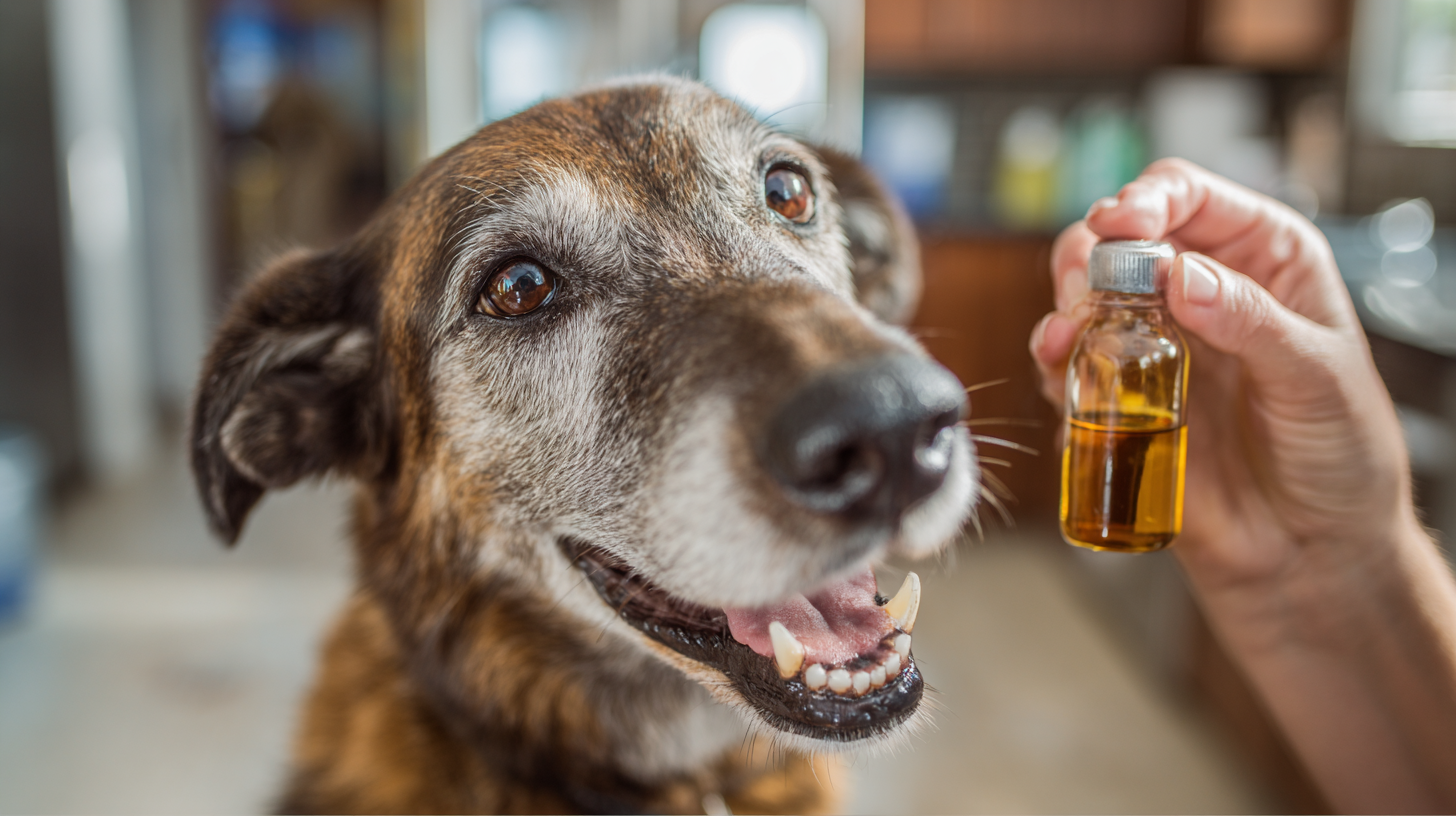Discover 6 incredible benefits of salmon oil for dogs! Expert guide covers dosage, safety, and how omega-3s boost your dog’s health naturally.
Table of Contents
Did you know that over 60% of dogs suffer from skin allergies and joint issues that could be significantly improved with the right nutritional support? If you’re searching for a natural way to boost your furry friend’s health, salmon oil for dogs might be the game-changer you’ve been looking for.
As pet owners become increasingly conscious about their dogs’ wellness, salmon oil has emerged as one of the most powerful and natural supplements available. Rich in omega-3 fatty acids, particularly EPA and DHA, this golden elixir offers a multitude of health benefits that can transform your dog’s quality of life. Whether you’re dealing with a puppy’s developmental needs or an aging dog’s joint discomfort, salmon oil provides science-backed nutrition that veterinarians worldwide recommend.
In this comprehensive guide, we’ll explore the six incredible benefits of salmon oil for dogs, dive deep into proper dosage guidelines, address safety concerns, and help you make an informed decision about incorporating this superfood supplement into your pet’s daily routine. From shinier coats to improved cognitive function, the benefits of salmon oil extend far beyond what most pet owners realize.
Why Salmon Oil is a Nutritional Powerhouse for Dogs

Salmon oil for dogs stands out among supplements due to its exceptional omega-3 fatty acid profile. Unlike plant-based omega-3 sources, salmon oil contains both EPA (eicosapentaenoic acid) and DHA (docosahexaenoic acid) in forms that dogs can readily absorb and utilize.
The omega-3 fatty acids in salmon oil are considered essential because dogs cannot produce them naturally in sufficient quantities. These healthy fats play crucial roles in cellular function, inflammation regulation, and overall health maintenance. Wild-caught salmon, in particular, offers higher concentrations of these beneficial compounds compared to farm-raised alternatives.
Modern commercial dog foods often lack adequate omega-3 content, making supplementation increasingly important. The processing methods used in kibble manufacturing can destroy these delicate fatty acids, leaving many dogs deficient in this vital nutrient. This is where high-quality salmon oil supplementation becomes invaluable.
Promotes Radiant Skin and Lustrous Coat
One of the most visible benefits of salmon oil for dogs is the dramatic improvement in skin and coat health. Dogs receiving regular salmon oil supplementation often develop noticeably shinier, softer coats within 4-6 weeks of consistent use.
The omega-3 fatty acids in salmon oil work at the cellular level to strengthen the skin barrier function. This enhanced barrier helps retain moisture while keeping harmful bacteria and allergens at bay. Dogs with dry, flaky skin often see remarkable improvement as the anti-inflammatory properties of EPA and DHA reduce irritation and promote healing.
Real-World Case Study
Dr. Sarah Martinez, a veterinary dermatologist in Colorado, documented a case involving a 5-year-old Golden Retriever named Max who suffered from chronic dermatitis. After six weeks of salmon oil supplementation (following proper dosing guidelines), Max’s skin inflammation decreased by 70%, and his coat regained its natural luster.
The sebaceous glands in dogs’ skin require omega-3 fatty acids to produce healthy oils that naturally condition the coat. Without adequate omega-3 intake, dogs may develop dull, brittle fur that’s prone to breakage and shedding. Salmon oil addresses this deficiency directly, supporting the skin’s natural oil production and creating that coveted healthy glow.
Supports Joint Health and Mobility
As dogs age, joint health becomes increasingly important for maintaining quality of life. Salmon oil for dogs offers powerful anti-inflammatory benefits that can significantly impact joint comfort and mobility, particularly in senior dogs or breeds prone to hip dysplasia and arthritis.
The EPA component in salmon oil acts as a natural anti-inflammatory agent, helping to reduce the production of inflammatory compounds that contribute to joint pain and stiffness. Regular supplementation can help maintain cartilage health and support the synovial fluid that lubricates joints.
The Science Behind Joint Support
Research published in the Journal of Veterinary Medicine found that dogs receiving omega-3 supplementation showed a 25% improvement in mobility scores compared to controls. The study followed 120 dogs over 12 weeks, with participants showing reduced lameness and increased activity levels.
For dogs already experiencing joint discomfort, salmon oil can complement veterinary treatment plans. Many pet owners report that their dogs seem more willing to engage in physical activities after several weeks of consistent supplementation. However, it’s important to note that while salmon oil can be highly beneficial, it should never replace professional veterinary care for serious joint conditions.
For more expert pet care tips and product recommendations, visit BlithePet.com — your trusted source for pet wellness.
Boosts Immune System Function
A robust immune system is your dog’s first line of defense against illness and disease. The omega-3 fatty acids in salmon oil play a crucial role in supporting immune function by helping regulate inflammatory responses and supporting the production of immune-boosting compounds.
DHA, one of the primary omega-3s in salmon oil, is particularly important for immune cell membrane function. These healthy fats help immune cells communicate more effectively and respond appropriately to threats while avoiding overreaction that can lead to allergic responses or autoimmune issues.
Dogs with compromised immune systems, whether due to age, stress, or underlying health conditions, may benefit significantly from salmon oil supplementation. The anti-inflammatory properties can help reduce the chronic inflammation that often accompanies immune dysfunction, allowing the body’s natural defenses to function more efficiently.
Supporting Seasonal Allergies
Many dogs suffer from seasonal allergies that can make spring and summer miserable for both pets and owners. The anti-inflammatory effects of salmon oil can help reduce the severity of allergic reactions by stabilizing mast cells and reducing histamine release. While not a cure for allergies, consistent supplementation may help dogs better cope with environmental triggers.
Enhances Cognitive Function and Brain Health
The brain health benefits of salmon oil for dogs are often overlooked, but they’re particularly important for puppies in development and senior dogs experiencing cognitive decline. DHA is a major structural component of brain tissue, making up approximately 20% of the brain’s fatty acid content.
For growing puppies, adequate DHA intake supports proper brain development and can enhance learning ability and trainability. The neural pathways that form during puppyhood benefit from optimal omega-3 levels, potentially leading to better behavioral outcomes and easier training experiences.
Senior Dog Cognitive Support
Senior dogs may experience canine cognitive dysfunction (CCD), similar to dementia in humans. Symptoms include disorientation, changes in sleep patterns, and reduced interaction with family members. Studies suggest that omega-3 supplementation, particularly DHA, may help slow cognitive decline and support mental acuity in aging dogs.
A landmark study published in the British Journal of Nutrition followed 48 senior dogs for six months. Dogs receiving omega-3 supplementation showed significant improvements in learning tasks and memory retention compared to the control group. Pet owners reported that their dogs seemed more alert and engaged after consistent supplementation.
Supports Cardiovascular Health
Heart health is crucial for dogs of all ages, and salmon oil provides significant cardiovascular benefits through its omega-3 content. These healthy fats help maintain healthy blood pressure, support proper heart rhythm, and may reduce the risk of heart disease in susceptible breeds.
The anti-inflammatory properties of EPA and DHA help protect blood vessels from damage and support healthy circulation. This is particularly important for breeds prone to cardiac issues, such as Cavalier King Charles Spaniels, Dobermans, and larger breeds that may develop dilated cardiomyopathy.
Blood Pressure and Circulation Benefits
Regular salmon oil supplementation may help maintain healthy blood pressure levels in dogs. The omega-3 fatty acids support the flexibility of blood vessel walls, allowing for better blood flow and reduced strain on the cardiovascular system. This improved circulation benefits all body systems, from brain function to joint health.
Promotes Healthy Digestion and Gut Health
The connection between omega-3 fatty acids and digestive health is increasingly recognized in veterinary medicine. Salmon oil for dogs can help maintain a healthy gut lining, reduce inflammation in the digestive tract, and support the growth of beneficial bacteria.
Dogs with sensitive stomachs or inflammatory bowel conditions may benefit from the anti-inflammatory effects of salmon oil. The omega-3s help maintain the integrity of the intestinal barrier, preventing harmful substances from entering the bloodstream while allowing proper nutrient absorption.
Supporting the Gut Microbiome
Recent research has shown that omega-3 fatty acids can positively influence the gut microbiome by promoting the growth of beneficial bacteria while inhibiting harmful strains. A healthy gut microbiome is essential for proper digestion, immune function, and even mood regulation through the gut-brain axis.
How to Choose High-Quality Salmon Oil for Your Dog
Not all salmon oil products are created equal, and selecting the right supplement is crucial for ensuring your dog receives maximum benefits. Here are key factors to consider when choosing salmon oil for dogs:
Source and Purity
Look for salmon oil derived from wild-caught salmon, preferably from pristine waters like those around Alaska or Norway. Wild salmon typically contains higher concentrations of omega-3 fatty acids compared to farm-raised alternatives. The oil should be molecularly distilled to remove potential contaminants like mercury, PCBs, and other toxins.
Freshness and Processing
Omega-3 fatty acids are delicate and can become rancid quickly when exposed to heat, light, or air. Choose products that use cold-pressing methods and are packaged in dark, airtight containers. Some manufacturers add natural antioxidants like vitamin E to prevent oxidation and maintain freshness.
Third-Party Testing
Reputable manufacturers will have their products tested by independent laboratories for purity, potency, and contaminants. Look for products that provide certificates of analysis or have been verified by organizations like the International Fish Oil Standards (IFOS) program.
Packaging and Storage
Proper packaging is essential for maintaining oil quality. Look for products in dark glass bottles or opaque containers that protect against light exposure. Some liquid salmon oils require refrigeration after opening, while others are shelf-stable due to added antioxidants.
Proper Dosage Guidelines for Salmon Oil
Determining the correct dosage of salmon oil for dogs depends on several factors, including body weight, age, health status, and the specific product’s concentration. While general guidelines exist, it’s always best to consult with your veterinarian before starting any supplementation regimen.
General Dosing Recommendations
The typical recommended dosage is approximately 20-30 mg of combined EPA and DHA per pound of body weight daily. For example, a 50-pound dog would need roughly 1,000-1,500 mg of omega-3 fatty acids daily. However, this can vary significantly based on individual needs and product formulations.
Starting Slowly
When introducing salmon oil to your dog’s diet, start with about half the recommended dose for the first week. This allows your dog’s digestive system to adjust and helps prevent potential gastrointestinal upset. Gradually increase to the full dose over 7-10 days while monitoring your dog’s response.
Adjusting for Health Conditions
Dogs with specific health conditions may require adjusted dosing. For instance, dogs with inflammatory conditions might benefit from higher doses under veterinary supervision, while puppies or small dogs may need proportionally smaller amounts. Always work with your veterinarian to determine the optimal dosage for your dog’s specific needs.
Safety Considerations and Potential Side Effects
While salmon oil is generally safe for most dogs, there are important safety considerations to keep in mind. Understanding potential side effects and contraindications helps ensure your dog’s safety and maximizes the benefits of supplementation.
Common Side Effects
Most dogs tolerate salmon oil well, but some may experience mild digestive upset, particularly when starting supplementation. Common side effects include:
- Loose stools or diarrhea (usually temporary)
- Fishy breath or body odor
- Increased thirst or urination
- Mild nausea (rare)
These effects typically resolve within a few days as the dog’s system adjusts. If symptoms persist or worsen, discontinue use and consult your veterinarian.
Important Contraindications
Certain dogs should avoid salmon oil supplementation or require special veterinary oversight:
- Dogs taking blood-thinning medications (omega-3s can enhance anticoagulant effects)
- Dogs with bleeding disorders
- Dogs scheduled for surgery (discontinue 2 weeks prior)
- Dogs with severe liver disease
- Dogs with pancreatitis (high-fat content may trigger episodes)
Quality and Contamination Concerns
Low-quality fish oils may contain harmful contaminants like mercury, PCBs, or bacterial toxins. Always choose products from reputable manufacturers that provide third-party testing results. Signs of rancid oil include a strong fishy smell, cloudy appearance, or bitter taste.
Common Mistakes Pet Owners Make with Salmon Oil
Even well-intentioned pet owners can make mistakes when supplementing their dogs with salmon oil. Avoiding these common pitfalls ensures your dog receives maximum benefits while staying safe.
Mistake #1: Overdosing
More isn’t always better when it comes to salmon oil supplementation. Excessive omega-3 intake can lead to vitamin E deficiency, impaired immune function, and increased bleeding risk. Stick to recommended dosages and avoid the temptation to increase amounts without veterinary guidance.
Mistake #2: Ignoring Storage Requirements
Improper storage can render salmon oil ineffective or even harmful. Many pet owners leave opened bottles at room temperature or in bright areas, causing the oil to become rancid. Always follow storage instructions and check for signs of spoilage before each use.
Mistake #3: Expecting Immediate Results
While some dogs may show improvements in skin and coat within 2-3 weeks, most benefits take 6-12 weeks of consistent supplementation to become apparent. Joint health improvements may take even longer. Patience and consistency are key to seeing optimal results.
Mistake #4: Not Consulting a Veterinarian
Many pet owners start supplementation without professional guidance, potentially missing important contraindications or drug interactions. Always discuss new supplements with your veterinarian, especially if your dog has existing health conditions or takes medications.
When to Consult Your Veterinarian
While salmon oil is generally safe for most dogs, certain situations require professional veterinary input. Knowing when to seek guidance ensures your dog’s safety and optimal health outcomes.
Before Starting Supplementation
Consult your veterinarian before beginning salmon oil supplementation if your dog:
- Has any chronic health conditions
- Takes any medications regularly
- Has a history of allergic reactions to fish or seafood
- Is pregnant or nursing
- Is under 12 weeks of age
During Supplementation
Contact your veterinarian immediately if your dog experiences:
- Persistent vomiting or diarrhea
- Signs of allergic reaction (swelling, difficulty breathing, hives)
- Unusual bleeding or bruising
- Dramatic changes in appetite or behavior
- Worsening of existing health conditions
Monitoring Long-term Use
Dogs on long-term salmon oil supplementation should have regular veterinary check-ups to monitor:
- Blood clotting times (if relevant)
- Liver function
- Overall health status
- Supplement effectiveness
Common Misconceptions About Salmon Oil
Several myths surround salmon oil supplementation in dogs. Let’s address the most common misconceptions with factual information.
Myth #1: All Fish Oils Are the Same
Fact: Different fish oils contain varying concentrations of EPA and DHA, and quality can vary dramatically between manufacturers. Salmon oil specifically offers an optimal ratio of omega-3 fatty acids and is generally better tolerated than other fish oils.
Myth #2: Salmon Oil Will Make My Dog Gain Weight
Fact: While salmon oil does contain calories (about 9 calories per gram), the typical supplementation amounts add minimal calories to your dog’s daily intake. The anti-inflammatory benefits may actually support healthy weight management by improving metabolism and reducing inflammation-related weight gain.
Myth #3: Human Fish Oil is Fine for Dogs
Fact: Human fish oil supplements often contain additives, flavorings, or concentrations that aren’t appropriate for dogs. Some may contain xylitol or other ingredients toxic to dogs. Always use products specifically formulated for canine consumption.
Creating a Salmon Oil Supplementation Plan
Developing a structured approach to salmon oil supplementation ensures consistency and maximizes benefits for your dog. Here’s a step-by-step guide to creating an effective supplementation plan.
Step 1: Veterinary Consultation
Schedule a consultation with your veterinarian to discuss your dog’s specific needs, health status, and any potential contraindications. Bring a list of current medications and supplements for review.
Step 2: Product Selection
Choose a high-quality salmon oil product based on the criteria outlined earlier. Consider factors like your dog’s size, palatability preferences, and any specific health concerns.
Step 3: Gradual Introduction
Start with half the recommended dose for the first week, gradually increasing to the full amount. Monitor your dog’s response and adjust as needed.
Step 4: Consistency and Monitoring
Establish a routine for daily supplementation and track your dog’s response. Keep a simple log noting any changes in skin condition, coat quality, energy levels, or overall well-being.
Step 5: Regular Evaluation
Schedule follow-up appointments with your veterinarian to evaluate the effectiveness of supplementation and make any necessary adjustments to the plan.
Educational Table:
Markdown Version:
FAQ Section :
Q: How long does it take to see results from salmon oil supplementation in dogs?
A: Most dogs show initial improvements in skin and coat quality within 3-4 weeks, with optimal results visible after 6-12 weeks of consistent supplementation. Joint health benefits may take 8-12 weeks to become apparent.
Q: Can I give my dog human fish oil instead of salmon oil made for dogs?
A: It’s not recommended to give dogs human fish oil supplements, as they may contain additives, artificial flavors, or concentrations inappropriate for canine consumption. Always use products specifically formulated for dogs.
Q: Are there any side effects of salmon oil for dogs?
A: Salmon oil is generally safe for most dogs, but some may experience mild digestive upset, fishy breath, or loose stools when starting supplementation. These effects typically resolve within a few days as the dog’s system adjusts.
Q: How should I store salmon oil for dogs?
A: Store salmon oil in a cool, dark place away from direct sunlight. Many liquid salmon oils require refrigeration after opening. Always check the manufacturer’s storage instructions and look for signs of rancidity before use.
Q: Can puppies take salmon oil supplements?
A: Yes, puppies can benefit from salmon oil supplementation, particularly for brain development and coat health. However, dosages should be adjusted for their smaller size and developing systems. Consult with your veterinarian for appropriate puppy dosing.
Q: What’s the difference between EPA and DHA in salmon oil?
A: EPA (eicosapentaenoic acid) primarily supports anti-inflammatory responses and joint health, while DHA (docosahexaenoic acid) is crucial for brain function and development. Both are important for optimal canine health.
Q: Should I give salmon oil to my dog every day?
A: Yes, salmon oil is most effective when given daily as part of a consistent supplementation routine. The omega-3 fatty acids need to build up in your dog’s system over time to provide maximum benefits.
Conclusion
Salmon oil for dogs represents one of the most beneficial and well-researched supplements available to pet owners today. From promoting radiant skin and lustrous coats to supporting joint health, cognitive function, and immune system strength, the benefits are both immediate and long-lasting.
The six incredible benefits we’ve explored—enhanced skin and coat health, improved joint mobility, stronger immune function, better cognitive performance, cardiovascular support, and digestive wellness—demonstrate why veterinarians and pet care experts consistently recommend high-quality salmon oil supplementation.
Remember that consistency is key when it comes to seeing optimal results. While some improvements may be visible within weeks, the full spectrum of benefits typically develops over several months of regular supplementation. Always choose high-quality products from reputable manufacturers and work closely with your veterinarian to ensure the best outcomes for your furry friend.
By incorporating salmon oil into your dog’s wellness routine, you’re providing them with essential nutrients that support their health from the inside out. The investment in quality supplementation today can lead to years of improved quality of life for your beloved companion.
Have a similar experience with your pet? Share it in the comments below! Don’t forget to check out our other helpful guides at BlithePet.com for more expert pet care advice.







